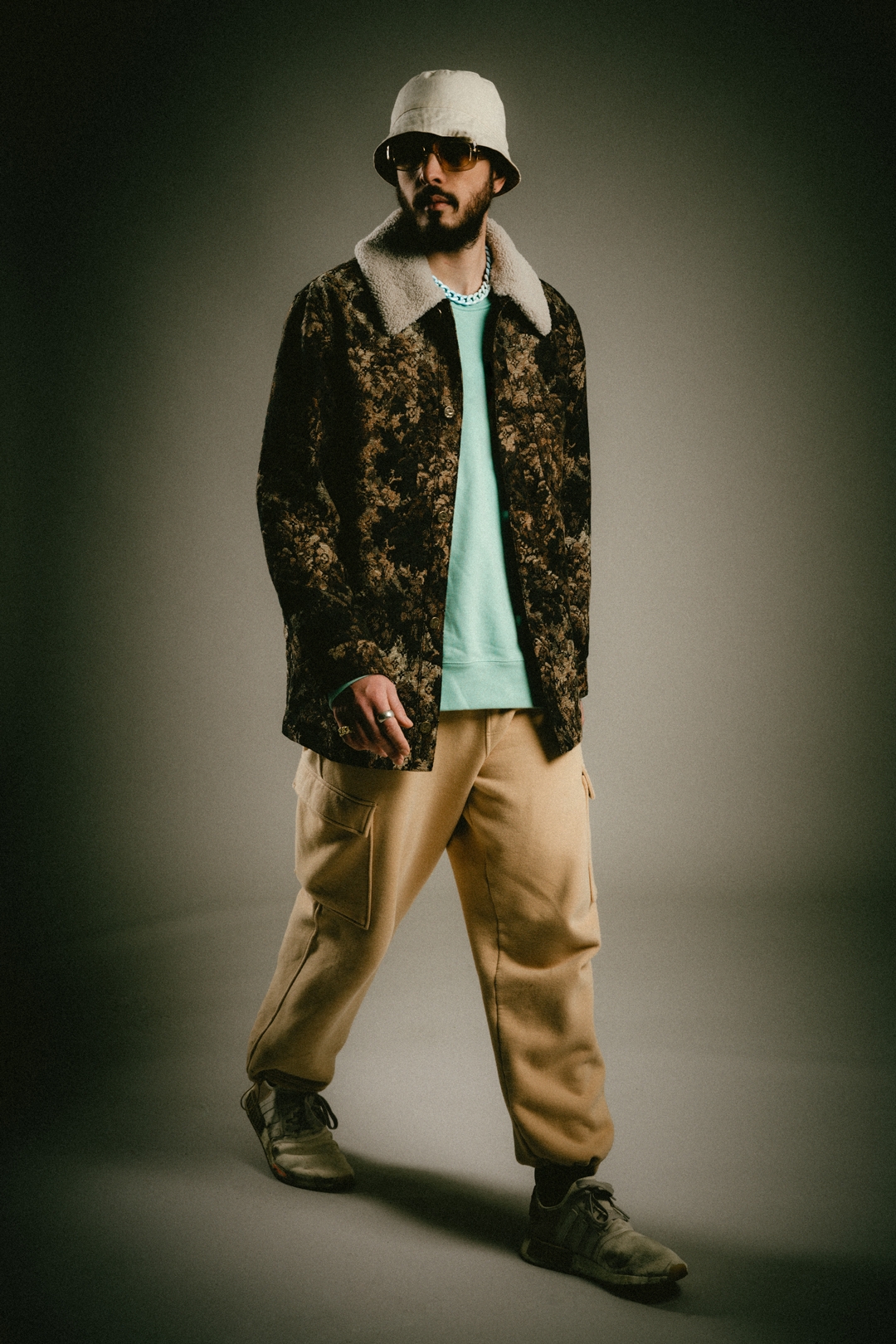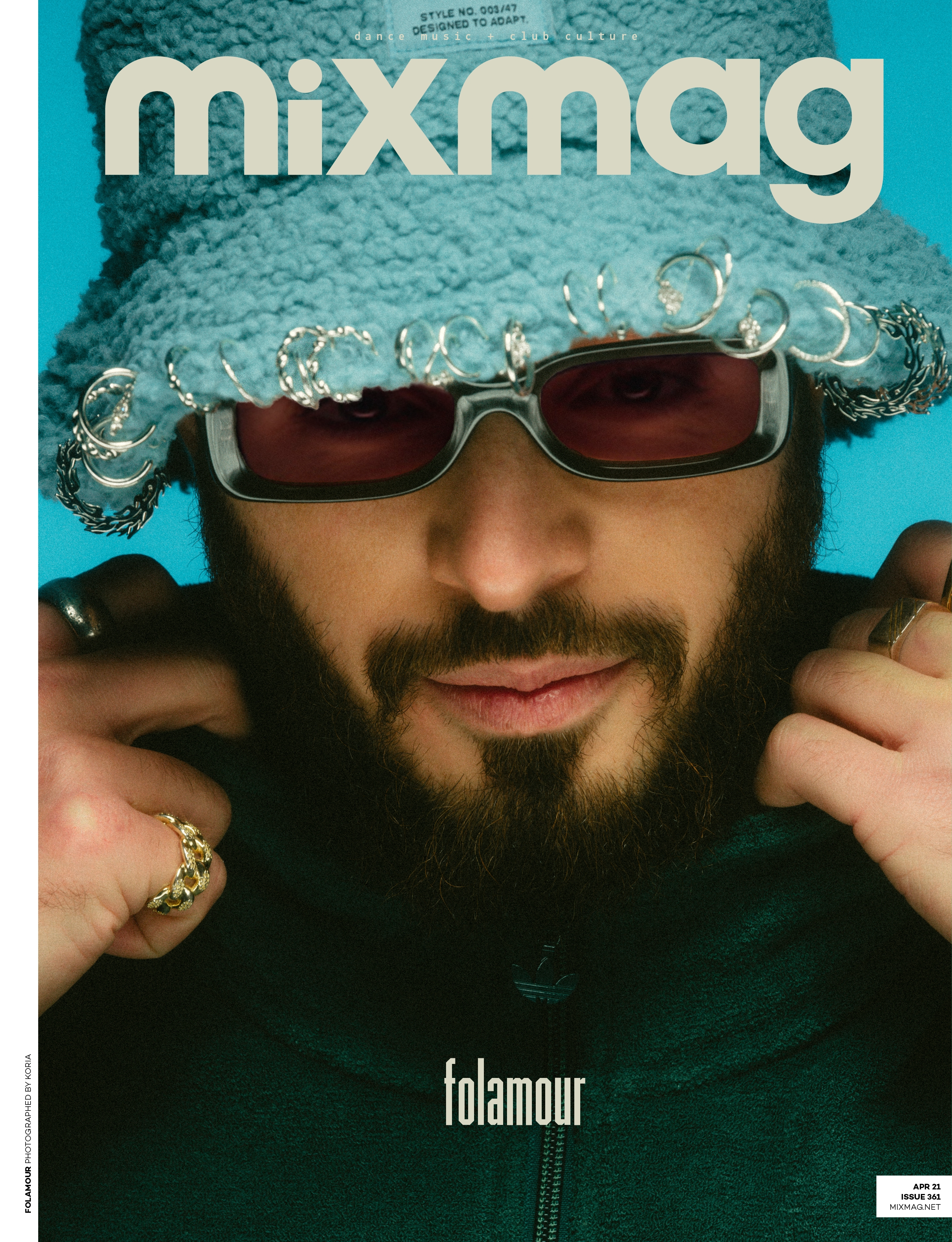 Features
Features
Folamour is on a journey to house music perfection
Since lockdown has put stop to Folamour's hectic touring schedule, the French artist is redirecting his energies into being the best producer he can be. Jemima Skala tells his story
Over Zoom from his home just outside Lyon, Folamour appears easy-going and relaxed. Dressed in his own uniform of a white bucket hat and an oversized sweatshirt, he explains that he’s changing pace. “I did 140 gigs in 2019, so a lot,” he laughs. “I don’t want to sound like I complain, it was truly my choice to tour as much as I did and I do as I want, but sometimes I regret wanting things. Every time I received an offer to go somewhere, I knew my people were waiting for me there, wanting to see me play, so obviously I was agreeing all the time. Then it was six months later, and I’d done twelve shows in the last three weeks. I was exhausted! Now I’m going to try to be a bit wiser when we go back to touring and take a bit more time for myself, even more so because I want to focus on improving my skills in terms of writing music.”


After grinding to a forced halt like the rest of the world in 2020, producer and FHUO label boss Folamour found himself with a lot of time on his hands, a particularly unusual sensation for him. Renowned for his thumping feel-good DJ sets and sample-heavy house productions, he decided to get to work learning how to do more live composition. His second album ‘Ordinary Drugs’ showcased a more sophisticated and joyful style of house production that evolved his collaged sampling approach in his debut album ‘Umami’, moving away from sampling by incorporating more synths and live instruments. As a further evolution of his style, Folamour felt that the only way he could express the tumult of the last three years of full-on touring and a brief stint living in London before moving back to France was to teach himself live composition. The result is ‘The Journey’, a soft, contemplative album that moves away from pure house rhythms to include ambience, soul and funk, and reflects a more tranquil side of Folamour.
Read this next: 20 of the best house music samples

With guest features from SG Lewis, vocalist and ex Orange Juice drummer Zeke Manyika and singer Tertia May, ‘The Journey’ not only represents Folamour’s journey over the past three years, but a more literal musical journey to gaining the skills he needed to make the kind of music he wants. A true fan of old school funk and soul, he’s been working towards making music that fits in more with his musical tastes. House music was initially a way for him to incorporate the original samples that he loved into a new kind of music. “I’ve always been really honest about how I produce my music, and each of my albums are the result of what the best music is that I can make at that moment. When I did ‘Umami’, I wasn’t really a good musician, so I was using a lot of samples. When I started being good at synths, drums and guitars, I started to move on, and now I’m trying to sing on this record too. Every album is a step to trying to be better at everything, to be able to put out the music that’s closest to what I really want to put out. This is what’s made my music evolve, and I think it’s going to evolve over the next twenty years because I’m going to get better at what I’m trying to do, and it’s going to get closer and closer to exactly what I want.”


It's been a constant process of being a beginner for Folamour to even get to where he is now. As a young child, he played guitar and drums. “These were my toys. My parents were patient enough to give me instruments when I was six years old without trying to strangle me, so that was nice,” he laughs. He busked for a while, playing in rock, heavy metal and reggae bands before trying his hand at DJing. Six years ago, he fell ill and was in bed for two months. To alleviate the boredom, he downloaded Ableton and taught himself production. ‘The Journey’ sees Folamour relearning his musical roots, getting back into the mindset that imperfections only enrich the tapestry.
Read this next: The Cover Mix: Folamour
Though he describes ‘The Journey’ as “a bit less clubby” than his previous records, Folamour feels that the element of live composition adds a certain movement to the record. “It adds imperfections on the grooves. Everything is recorded live, so not everything is perfectly quantised, perfectly on time, so it adds a bit of life into it, a bit of truth.” This element of truth carries through to his chosen collaborators: after “listening to too much music and finding Zeke’s voice”, Folamour produced an instrumental expressly for Manyika and “now I have a new friend in my life, I love that guy”; he fell in love with Tertia May’s voice after hearing her play at a gig, booked a studio for them and wrote their song ‘Rue de Paradis’ in a day; he and SG Lewis played Printworks together and had been corresponding for some time afterwards before deciding to write a track together. “I’m really humbled to have been able to work with them because all three are so talented,” he says. “There were a few artists that I wanted to work with that we contacted, and they never answered or they weren’t interested, so there were more that I wanted to have, but these three were really natural. We were in touch from the beginning with no manager included. In the end, maybe it was just fate that it stayed really natural and organic.”

This organicism carries through to Folamour’s decision to write, record and produce his own vocals for ‘The Journey’. Although it’s something that he’s wanted to do for a long time—he’s only sung once openly on his remix of Totally Enormous Extinct Dinosaur’s ‘Energy Fantasy’, otherwise it’s smattered subtly across his previous two albums—he wanted to take the time to write the lyrics and melodies himself. “It takes a lot of time and I don’t have that when I’m touring,” he explains. The vulnerability of singing as an untrained vocalist has brought a few anxieties: “You really feel naked. It feels amazing and exciting, and at the same time it’s terrible, you feel like you’ve never done anything good in your life.”
Folamour isn’t a stranger to diving into the unfamiliar headfirst. It was his daringness during his Boiler Room set at FLY Open Air in 2019 that first endeared him to the world: who can forget the infamous Abba moment, when he dropped Mighty Mouse’s ‘Midnight Mouse’, a house edit of ‘Gimme! Gimme! Gimme! (A Man After Midnight)’, right in the middle of his set? As well as popping off live, the moment went viral online. Far from being a planned thing, Folamour thought he would be laughed off the decks: “from a French perspective, I have no idea what people could find almost offensive musically at a party. It could have been people being really angry and throwing tomatoes at me!” He was so buoyed by the crowd’s energy that he took the risk and boy did it pay off.

In his own tastes, he says he doesn’t discriminate. “I really love everything, and I don’t make distinctions between them.” This was something that he learned from a young age, his parents listening to things like Oasis, Radiohead, Lenny Kravitz and Red Hot Chilli Peppers before he found his own way into hip hop, neo soul and funk and soul. “What I took from my parents was just listening to music that you love and not paying attention to what it is. We didn’t care about whether or not it’s famous, whether or not it’s pop, whether or not it’s cool. We didn’t give a damn about that—we were just listening to music that we loved,” he remembers. This shines through when we get to discussing Abba in more depth. “No one discovered that song because of me, for sure,” he admits laughingly, “but I think a lot of people maybe noticed how amazing it is because a lot of people thought it was a house remix, but it’s only an edit. The song really sounds like that.” He waxes lyrical about the mastery of Abba’s song production before declaring, “You never heard music if you think Abba is shit. You can think Abba is marketing or a fake band, and it might be true, but thinking that it’s bad music really shows a lack of knowledge in terms of music writing and production.”

Perhaps this confidence in his own voice and ideas is what sets Folamour apart from an identifiable scene. Lyon has always been more known for industrial techno and club music, which he didn’t fit into as a young man just moved to the city. He left Lyon recently for a year and a half to live in London, returning for lockdown last year to be nearer to his family and friends. “I’m trying not to be a part of a scene, in a way,” he says. “I’m trying to fight more for my ideas and beliefs than for a small group of people.” As an artist with such a global reach, he says he finds it weird to “defend one small city or one country”. This was intensified by his stay in London, which was a lonely time. “It’s hard when you have a job that already takes up so much space in your life to live in a city that makes everything complicated.” With an intensive touring schedule and very little time off, London became an isolating place where he didn’t so much embed himself in the music scene but gathered small scraps of inspiration, squirrelling them away to use in his next big project.
Read this next: Heart of darkness: The Secret DJ on touring

In spite of a year that has been disastrous for clubs, nightlife and DJ touring, Folamour sees this sharp blade of reality as having a velvet-covered handle. He is very much of the school of thought that as touring has increased, the quality of electronic music being released has dropped, as DJ/producers are simply too depleted to make a good job of it. “I’m sure the level of creativity in electronic music is blowing up right now since the past year,” he says. “I think it’s going to keep being like that. Having a break makes producers more able to produce more diverse stuff because they have so much more time. If Pink Floyd had only two days during a couple of weeks in the month to produce an album, they would never have been close to that good. I think a lot of DJs are amazing producers, but they just don’t put enough time into their stuff. It’s really rare to have that rush of creativity so that you can write something amazing in a day. If you try to make an album out of that feeling, it can be really hard on top of being exhausted from touring, needing to eat, travelling.”
Read this next: Does touring kill creativity?
There’s a hopefulness and joy that’s tangible throughout Folamour’s demeanour and productions. He laughs easily and fully, gets visibly impassioned when he’s on a roll. It’s not lost on him that he occupies a very special place as someone who’s become globally famous doing something he loves, and ‘The Journey’ is his opportunity to process some of the grey areas of being a world-famous DJ. “I think my music is really hopeful,” he says. “Sometimes it’s rooted in darker stuff— ‘The Journey’ is about immigration; ‘Just Want Happiness’ is rooted in nostalgia—but you can hear the hope. It’s about believing in the future, in yourself, and trying your best to make it bright.”
Folamour's new single 'The Journey' is out now, get it here
Jemima Skala is Mixmag’s Weekend Editor and freelance writer. Follow her on Twitter




